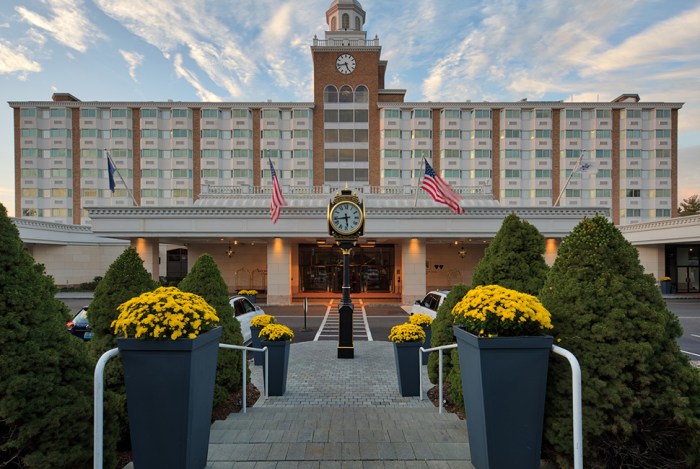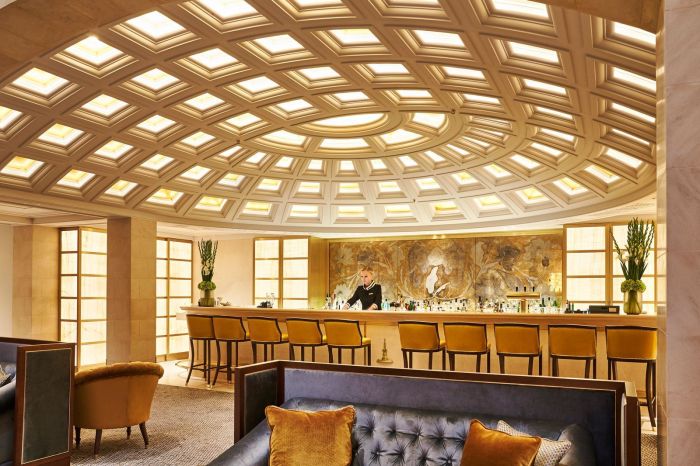Hotels That Combine Hospitality And Historic Significance
Hotels That Combine Hospitality and Historic Significance offer a unique blend of charm and comfort, inviting guests to step into a world where the past meets the present. These remarkable establishments not only provide a place to stay but also serve as living museums, preserving stories, architecture, and traditions that shape their surroundings. By honoring history while delivering excellent service, these hotels create memorable experiences that linger long after guests check out.
The significance of such hotels goes beyond their age; they embody the cultural and historical narratives of their locations. The preservation of these properties enriches the travel experience, allowing visitors to connect with the heritage of the area while enjoying modern conveniences. With each stay, guests become part of a story that transcends time.
Historical Significance of Hotels
The preservation of historical hotels is essential in today’s society as they embody the stories and cultures of the past, connecting us to our heritage. These establishments serve as living museums, offering guests not just a place to stay, but a glimpse into different eras and lifestyles. They enrich our understanding of history and allow us to appreciate the artistry and craftsmanship of previous generations.
Historical hotels significantly enhance the guest experience through their unique charm and rich narratives. Staying in a hotel with historical significance provides an immersive experience, allowing guests to walk through the same halls once tread by notable figures. This connection to the past elevates a simple visit into a memorable journey through time, making guests feel like part of a larger story.
Key Characteristics of Historic Hotels
Understanding the defining features of historic hotels helps to appreciate their value in hospitality. These characteristics often contribute to their allure and significance:
1. Architectural Style
Historic hotels typically showcase distinctive architectural styles reflective of the time period in which they were built. This includes ornate facades, grand staircases, and intricate details that highlight craftsmanship and design trends of the era.
2. Cultural Heritage
Many historic hotels are tied to significant local events or famous figures, adding depth to their identity. This cultural connection invites guests to explore the surrounding area’s history and heritage.
3. Unique Furnishings and Decor
The interior of historic hotels often features antique furniture, original artworks, and vintage decor, creating an ambiance that transports guests back in time. Each piece tells a story, adding to the hotel’s character.
4. Historic Events
Many of these hotels have hosted important events, from political gatherings to celebrity stays. This storied past enriches the experience for guests who appreciate the historical context of their surroundings.
5. Legacy of Hospitality
Historic hotels often have a long-standing tradition of hospitality, with practices that have been handed down through generations. This legacy creates a warm and inviting atmosphere, making guests feel right at home.
“Historical hotels are not just places to stay; they are portals to the past, offering experiences that linger in the hearts of their guests.”
Examples of Hotels with Historical Value
Hotels with historical significance not only offer a place to stay but also a glimpse into the past. They weave stories through their walls and provide guests with unique experiences that go beyond typical hospitality. These establishments preserve the legacy of significant events and figures, allowing visitors to connect with history in a profound way.Among the most notable hotels around the world, certain establishments stand out due to their rich histories and architectural beauty.
Their design elements reflect the era in which they were built and the unique stories they hold.
Noteworthy Historic Hotels
The following hotels are renowned for their historical value, each with its own compelling narrative and architectural charm.
- The Raffles Hotel, Singapore: Established in 1887, this iconic hotel boasts a colonial architecture style with grand pillars and a striking façade. It has hosted numerous famous guests, including Ernest Hemingway and Charlie Chaplin. The hotel is particularly known for its Long Bar, where the Singapore Sling cocktail was invented.
- The Savoy, London: Opened in 1889, The Savoy is celebrated for its Art Deco and Edwardian design. The hotel has served as a backdrop to many historical events, including royal gatherings and cultural milestones. It was the first hotel in Britain to have electric lights and an elevator.
- The Hotel del Coronado, California: Built in 1888, this beachfront hotel is an architectural marvel with its Victorian wood-frame structure. It has been the site of numerous film shoots and was famously featured in the classic movie “Some Like It Hot.” The hotel is also reputed to be haunted, adding to its mystique.
- The Fairmont Banff Springs, Canada: Known as the “Castle in the Rockies,” this hotel was constructed in 1888 in a Scottish baronial style. It is surrounded by breathtaking mountain scenery and has hosted many dignitaries, including Queen Elizabeth II. The hotel features luxurious décor, grand ballrooms, and a rich history tied to the development of the Canadian Pacific Railway.
- The Omni Grove Park Inn, North Carolina: This historic hotel has been welcoming guests since 1913. Its Arts and Crafts style architecture includes a stunning stone façade and beautifully crafted interiors. The hotel has hosted numerous famous figures, including F. Scott Fitzgerald and Thomas Edison, and is known for its luxurious spa and golf course.
These hotels are not merely places to rest; they embody rich narratives that connect guests to the past, each corner telling stories of significant occurrences or illustrious personalities who once roamed their halls. Their unique architecture and carefully preserved designs invite visitors to step back in time and experience a slice of history firsthand.
Hospitality in Historic Hotels

Source: forbestravelguide.com
Historic hotels are not just places to stay; they are gateways to the past, filled with stories and traditions. The hospitality practices in these establishments often reflect a dedication to service that transcends time, creating an experience that modern hotels find hard to replicate. This commitment to excellence not only enhances the guest experience but also preserves the heritage of the location.The hospitality in historic hotels is characterized by a deep respect for tradition, where every detail is carefully curated to provide a unique experience.
Staff at these venues undergo extensive training that emphasizes the importance of service excellence, often learning the history of the hotel itself as part of their education. This knowledge enables them to share stories with guests, creating a personal connection that enhances the overall stay. Their ability to blend warmth and professionalism is what sets historic hotels apart.
Staff Training Emphasizing Tradition and Service Excellence
Training protocols in historic hotels often include modules that focus on the history of the establishment, local culture, and the legacy of hospitality. This approach ensures that staff members not only perform their duties efficiently but also embody the spirit of the hotel’s traditions. Through detailed workshops, role-playing scenarios, and shadowing experienced employees, new hires learn the nuances of providing personalized service.
Key elements of this training can include:
- Understanding the hotel’s history and its role in the community, allowing staff to narrate engaging stories to guests.
- Practicing traditional service techniques that have been refined over generations, such as formal dining etiquette.
- Learning to anticipate guests’ needs, fostering a proactive approach to service.
This rigorous training cultivates a team that is not just skilled but also passionate about maintaining the hotel’s esteemed legacy.
Blend of Modern Amenities with Classic Hospitality Standards
Historic hotels excel at merging the charm of the past with the conveniences of the present. They often feature upgraded facilities that provide the comfort modern travelers expect, while still maintaining elements that evoke nostalgia. This blend is evident in the architecture, décor, and services offered.The integration of modern amenities can be seen in:
- High-speed internet access and smart technology seamlessly integrated into classic interiors, allowing for connectivity without sacrificing aesthetic charm.
- Luxury spa services and fitness centers that enhance the guest experience while respecting the historic fabric of the hotel.
- Gourmet dining options that honor traditional recipes but incorporate contemporary culinary trends, appealing to diverse palates.
By striking this delicate balance, historic hotels create an inviting atmosphere that respects their heritage while catering to the evolving needs of guests.
“Historic hotels are a testament to the art of hospitality, where every guest is treated not just as a visitor, but as a part of a living legacy.”
The Role of Local Culture in Historic Hotels

Source: thedesigngesture.com
Historic hotels are not just places to stay; they are portals to the past, allowing guests to immerse themselves in the cultural heritage of their locations. These establishments often reflect the architectural styles, local customs, and historical narratives that characterize their surroundings, making each visit a unique experience steeped in local flavor.Incorporating local traditions into the hotel experience enriches guests’ stays and fosters a deeper understanding of the community.
When hotels embrace their cultural roots, it enhances the authenticity of the guest experience, allowing visitors to connect with the essence of the destination. This commitment to local culture can be seen in various aspects of hotel operations, from decor to dining options.
Local Cuisine Served in Historic Hotel Restaurants
Food is a powerful expression of culture, and historic hotel restaurants often showcase regional culinary traditions that tell a story of their own. By offering local cuisine, these hotels invite guests to savor the flavors and ingredients that define their locales. This not only enhances the dining experience but also supports local farmers and artisans. For example, the historic Hotel del Coronado in California features a menu that highlights fresh seafood and regional dishes, providing guests with a taste of the Pacific coastal culture.
Similarly, the Fairmont Banff Springs in Canada offers traditional Canadian fare, including locally sourced game meats and seasonal vegetables, capturing the essence of the Canadian Rockies. Additionally, the historic Drake Hotel in Chicago celebrates Midwestern cuisine, with dishes inspired by the diverse cultural influences that have shaped the city. Each of these hotels takes pride in their culinary offerings, ensuring that guests leave not only with memories of their surroundings but also with a palate enriched by local tastes.
“Food is the common ground, a universal experience.”
By embracing local culture through cuisine and traditions, historic hotels create an atmosphere that is both welcoming and educational. Guests leave with not only a sense of having stayed in a significant place but also having experienced the heart of the community itself.
Challenges in Maintaining Historic Hotels
Maintaining historic hotels is a labor of love, requiring dedication to both preservation and guest experience. These unique establishments often come with their own set of challenges, balancing the need for modern amenities with the desire to honor their storied pasts. Understanding these challenges is essential for ensuring that historic hotels remain relevant and sustainable in the face of changing times.Historic hotels frequently face issues related to structural integrity, code compliance, and the preservation of original materials.
Many buildings are subject to restrictions that limit the type of renovations that can be performed, as alterations might compromise their historical significance. Additionally, the financial burden of maintaining aging infrastructure can be daunting. Owners must navigate these complexities while also ensuring that the hotel remains competitive in a rapidly evolving hospitality landscape.
Balancing Modernization and Historical Integrity
Striking a balance between modernization and historical integrity is crucial for the survival of historic hotels. While guests often expect contemporary comforts, such as high-speed internet and updated bathrooms, the essence of the hotel’s history must not be lost in the process. To achieve this balance, hotel management can adopt several strategies:
- Careful Renovation Planning: Engage preservation specialists when planning renovations to ensure that changes honor the building’s historical significance.
- Adaptive Reuse: Implement modern amenities that blend seamlessly with historical elements, ensuring that upgrades enhance rather than detract from the original design.
- Guest Education: Inform guests about the hotel’s history and the significance of its architecture, fostering appreciation for both modern and historic features.
- Community Involvement: Collaborate with local historians and cultural organizations to maintain authenticity and showcase the hotel’s heritage.
Strategies for Sustainable Tourism in Historic Hotel Management
Sustainable tourism is increasingly important in the hospitality industry, and historic hotels can play a significant role in promoting responsible travel. Implementing sustainable practices not only helps the environment but also enhances the historical value of these properties.Successful strategies include:
- Eco-Friendly Renovations: Use sustainable materials and practices in renovations to minimize environmental impact while preserving historical integrity.
- Local Sourcing: Partner with local businesses for supplies and services, supporting the local economy and reducing carbon footprints.
- Community Engagement: Involve guests in local cultural events and engagement opportunities, allowing them to connect with the community and its history.
- Preservation Programs: Invest in programs that aim to protect and restore not only the hotel but also the surrounding historical sites, ensuring a rich experience for future visitors.
“Sustainable tourism in historic hotels is not just about preserving the past; it’s about enriching the future.”
Future of Historic Hotels

Source: architecturaldigest.com
The future of historic hotels lies at the intersection of tradition and innovation, as these establishments adapt to the changing landscape of the hospitality industry. With travelers increasingly seeking unique experiences that blend comfort with culture, historic hotels are poised to evolve in ways that celebrate their legacy while incorporating modern conveniences.The hospitality industry is witnessing a shift towards sustainability, and historic hotels are not exempt from this trend.
Many are embracing eco-friendly practices to enhance their appeal to environmentally conscious travelers. This may include energy-efficient renovations that preserve the charm of the original architecture while reducing the hotel’s carbon footprint.
Impact of Technology on Preservation and Guest Experience
Technology plays a crucial role in both the preservation of historic hotels and the enhancement of the guest experience. Innovations in preservation techniques allow these hotels to maintain their structural integrity while integrating modern amenities. For example, advanced materials and building techniques can help to restore aged facades without compromising their historical significance.Guest experience is being transformed through the introduction of digital tools.
Mobile apps provide guests with immersive experiences, offering guided tours that highlight the hotel’s history and its surroundings. Virtual reality can transport visitors back in time, allowing them to experience significant historical events that took place in the hotel or the local area.
Innovative Ways to Enhance Visitor Engagement with History
To further engage visitors with the rich history of historic hotels, several innovative strategies can be implemented. These methods not only educate guests but also make their stay more memorable. One approach is to create interactive exhibits within the hotel. For instance, a gallery showcasing photographs and artifacts from the hotel’s past can allow guests to explore its history at their own pace.
Another option is to offer themed events that celebrate the hotel’s heritage. This could include hosting historical reenactments, where actors bring stories from the hotel’s past to life, or organizing workshops that teach guests about the local traditions and crafts that have shaped the area.Additionally, partnerships with local historians or cultural institutions can lead to curated experiences. These collaborations might involve guided walking tours of the neighborhood or lectures that delve into the history of the region, enriching the overall stay for visitors.By embracing these trends and technologies, historic hotels can ensure they remain relevant and appealing to future generations of travelers, maintaining their status as cherished landmarks in the hospitality industry.
Guest Experiences in Historic Hotels
Imagine stepping into a world where each corner whispers tales of the past, and the very walls seem to breathe history. A guest’s journey in a historic hotel is often spellbinding, filled with unique experiences that transport them through time. From the moment they arrive, guests are enveloped in an atmosphere that celebrates both hospitality and storied significance.The charm of historic hotels lies not only in their architecture and decor but also in the variety of experiences they offer.
Many of these hotels engage their guests through curated activities, allowing them to immerse themselves in the local culture and history. This connection to the past enhances the overall experience, making it memorable and meaningful.
Unique Experiences for Guests
Historic hotels often provide a range of activities and events that highlight their heritage and the surrounding area. These experiences allow guests to delve deeper into the local culture while enjoying their stay. Here are some popular offerings:
- Guided Historical Tours: Many hotels arrange guided tours that showcase their architecture, past guests, and the historical milestones that took place on their premises, offering a fascinating glimpse into the lives of those who walked through the same doors.
- Culinary Experiences: Some historic hotels feature renowned restaurants that serve dishes inspired by the region’s culinary traditions, often using recipes that have been passed down through generations.
- Cultural Events: Guests might enjoy live music, traditional performances, or art exhibitions that reflect the local heritage, creating a rich tapestry of engagement.
- Workshops and Classes: Many historic hotels offer workshops in traditional crafts, cooking classes, or local art, providing guests with hands-on experiences that connect them to the area’s culture.
- Seasonal Festivals: Throughout the year, historic hotels often participate in or host local festivals, which include food fairs, craft markets, and celebrations that showcase local history and traditions.
Guest testimonials reflect the profound impact these unique experiences have on their stay. Many describe their time in historic hotels as transformative, where they felt a strong connection to the past.
“Staying at the old mansion felt like stepping back in time. The guided tour revealed stories of the families who once lived there, making it so much more than just a hotel stay.” – Emily R.
“The cooking class we took in the hotel’s grand kitchen was unforgettable. The chef explained recipes that were decades old, and we left with not just new skills but also a deeper appreciation for local culture.” – James T.
Guests frequently express how these experiences enriched their travel adventures. By merging the comfort of modern hospitality with the depth of historical significance, historic hotels provide moments that linger long after the stay has ended. Each visit becomes a treasured memory, a story to share, and a bridge connecting the past with the present.
Last Point
In conclusion, the allure of hotels that blend hospitality and historic significance lies in their ability to connect guests with the rich tapestry of history and culture. As these establishments navigate the challenges of preservation and modernization, they continue to share unique stories that enhance our understanding of the past. Whether relishing in their exquisite architecture or enjoying local cuisine, visitors leave with a deeper appreciation for the heritage that shapes our world.
FAQ Insights
What makes a hotel historically significant?
A hotel is considered historically significant if it possesses architectural value, is associated with notable events or figures, or represents the cultural heritage of its location.
How do historic hotels ensure modern guest comfort?
Historic hotels often blend modern amenities like Wi-Fi and updated bathrooms with classic designs, ensuring guests enjoy comfort without losing the charm of the past.
Are there specific regulations for maintaining historic hotels?
Yes, many countries have regulations and guidelines to protect historic properties, focusing on preservation while allowing for necessary updates to ensure guest safety and comfort.
Can I find local cuisine in historic hotel restaurants?
Absolutely! Many historic hotels pride themselves on incorporating local flavors and traditional dishes into their dining experiences, reflecting the culture of their surroundings.
What role do staff play in enhancing the guest experience in historic hotels?
Staff in historic hotels receive training that emphasizes their property’s history, helping them provide knowledgeable service that enriches guests’ experiences through storytelling and personal interaction.









